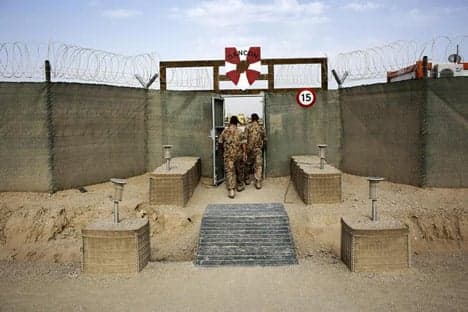Last Danish troops leave Camp Bastion

Nineteen soldiers and over 50 heavily-loaded planes are on their way back to Denmark a week earlier than planned.
The last Danish soldiers have left Camp Bastion in southern Afghanistan, the Army Operational Command (Hærens Operative Kommando - HOK) said on Friday. The withdrawal is taking place a week earlier than originally scheduled. The last 19 Danish soldiers will be flown back to Denmark on Friday after having left Camp Bastion on July 27th. HOK said a total of 54 heavy-loaded planes carrying 2,348 tonnes of material is being transported back to Denmark by way of Dubai. “That’s the equivalent of eight long rows of midsize cars. There are 133 containers, 82 vehicles and 1,010 pieces of other goods,” HOK said in a press release. A total of four Danes – two interpreters and two medical personnel – will remain in Camp Bastion to support British troops through September. Denmark formally ended its 12-year military engagement in Afghanistan on July 22nd of last year. Forty three Danish soldiers lost their lives in Afghanistan and the war cost a total of 15 billion kroner ($2.7 billion). In June, it was announced that Denmark had agreed to send three military transport helicopters and 76 soldiers to Afghanistan to support German soldiers based in Camp Marmal near Mazar-e Sharif.
Comments
See Also
The last Danish soldiers have left Camp Bastion in southern Afghanistan, the Army Operational Command (Hærens Operative Kommando - HOK) said on Friday.
The withdrawal is taking place a week earlier than originally scheduled.
The last 19 Danish soldiers will be flown back to Denmark on Friday after having left Camp Bastion on July 27th.
HOK said a total of 54 heavy-loaded planes carrying 2,348 tonnes of material is being transported back to Denmark by way of Dubai.
“That’s the equivalent of eight long rows of midsize cars. There are 133 containers, 82 vehicles and 1,010 pieces of other goods,” HOK said in a press release.
A total of four Danes – two interpreters and two medical personnel – will remain in Camp Bastion to support British troops through September.
Denmark formally ended its 12-year military engagement in Afghanistan on July 22nd of last year. Forty three Danish soldiers lost their lives in Afghanistan and the war cost a total of 15 billion kroner ($2.7 billion). In June, it was announced that Denmark had agreed to send three military transport helicopters and 76 soldiers to Afghanistan to support German soldiers based in Camp Marmal near Mazar-e Sharif.
Join the conversation in our comments section below. Share your own views and experience and if you have a question or suggestion for our journalists then email us at [email protected].
Please keep comments civil, constructive and on topic – and make sure to read our terms of use before getting involved.
Please log in here to leave a comment.